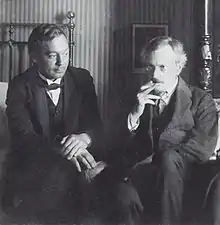J. V. Uspensky
James Victor Uspensky (Russian: Яков Викторович Успенский, romanized: Yakov Viktorovich Uspensky; April 29, 1883 – January 27, 1947) was a Russian and American mathematician notable for writing Theory of Equations.[2][3]
J. V. Uspensky | |
|---|---|
 Delaunay (left) with Uspensky | |
| Born | Yakov Viktorovich Uspensky (Russian: Яков Викторович Успенский) April 29, 1883 |
| Died | January 27, 1947 (aged 63) San Francisco, United States |
| Alma mater | University of St. Petersburg |
| Scientific career | |
| Fields | Mathematics, Number theory, Probability theory |
| Institutions | Stanford University, University of Minnesota |
| Doctoral advisor | Andrey Markov[1] |
| Notable students | |
Biography
Uspensky graduated from the University of St. Petersburg in 1906 and received his doctorate from the University of St. Petersburg in 1910. He was a member of the Russian Academy of Sciences from 1921.[4]
Uspensky joined the faculty of Stanford University in 1929-30 and 1930-31 as acting professor of mathematics. He was professor of mathematics at Stanford from 1931 until his death.[4] Uspensky was the one who kept alive Vincent's theorem of 1834 and 1836, carrying the torch (so to speak) from Serret.[5]
Books
- Uspensky, J. V. (1948). Theory of equations.
- Uspensky, J. V.; Heaslet, M. A. (1939). Elementary Number Theory.
- Uspensky, J. V. (1937). Introduction to mathematical probability.
Notes
- James Uspensky on the Mathematics Genealogy Project
- J. V. Uspensky (1948). Theory of Equations. Pp. vii. 353. New York: McGraw-Hill Book Co.
- Kenneth May (1949). "Book Review: Theory of Equations, by J. V. Uspensky". Popular Astronomy. 57: 46. Bibcode:1949PA.....57...46M. .
- Royden (1988).
- Uspensky's biography Archived 2020-10-07 at the Wayback Machine (in Russian).
References
- J. V. Uspensky (1931). "On Ch. Jordan's Series for Probability". Annals of Mathematics. Second Series. 32 (2): 306–312. doi:10.2307/1968193. JSTOR 1968193.
- J. V. Uspensky (1926–1927). "On the Development of Arbitrary Functions in Series of Hermite's and Laguerre's Polynomials". Annals of Mathematics. Second Series. 28 (1/4): 593–619. doi:10.2307/1968401. JSTOR 1968401.
- Halsey Royden (1988). The History of the Mathematics Department at Stanford, in A Century of Mathematics in America edited by Peter L. Duren, Richard Askey, and Uta C. Merzbach. American Mathematical Society, History of Mathematics Volume 2, Providence, Rhode Island. Link to PDF: "A History of Mathematics at Stanford" by Halsey Royden.
This article is issued from Wikipedia. The text is licensed under Creative Commons - Attribution - Sharealike. Additional terms may apply for the media files.